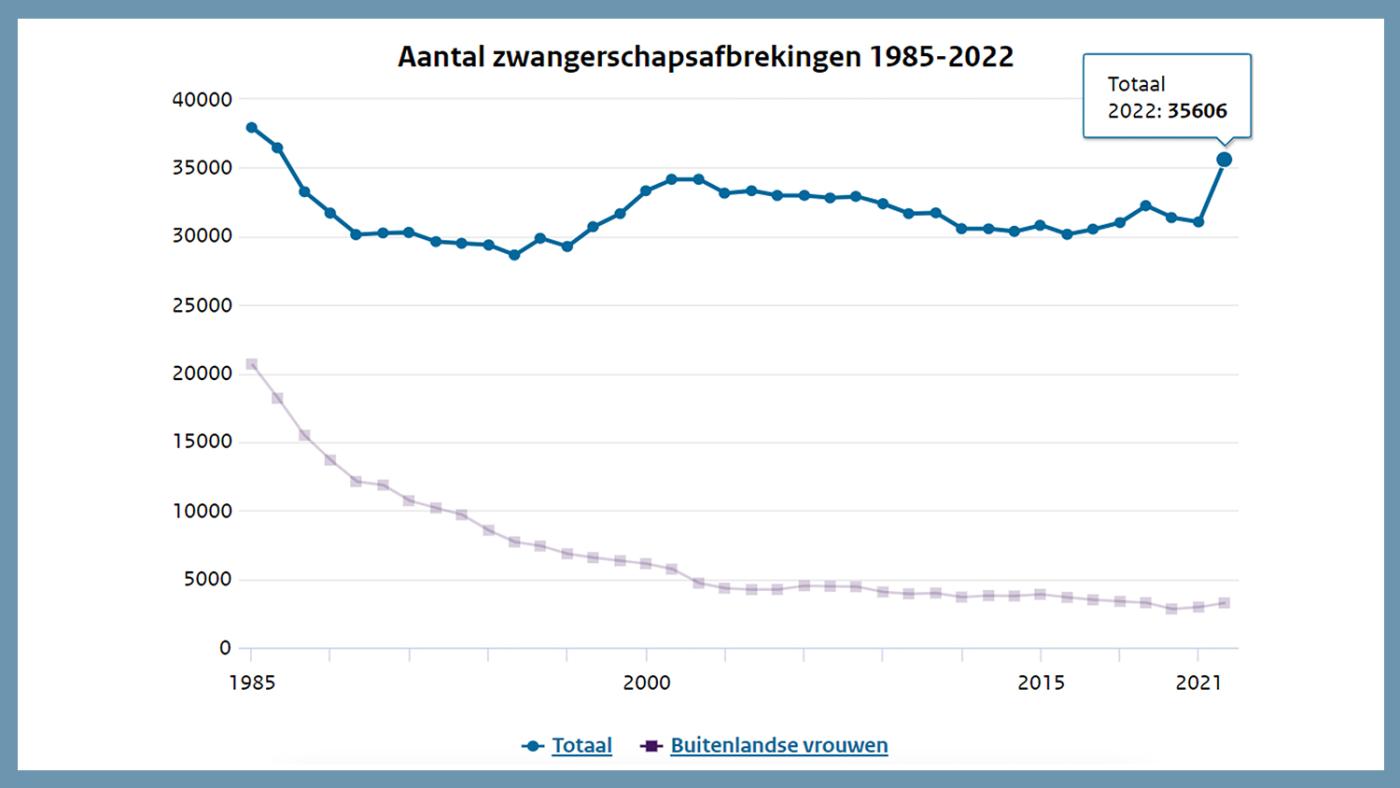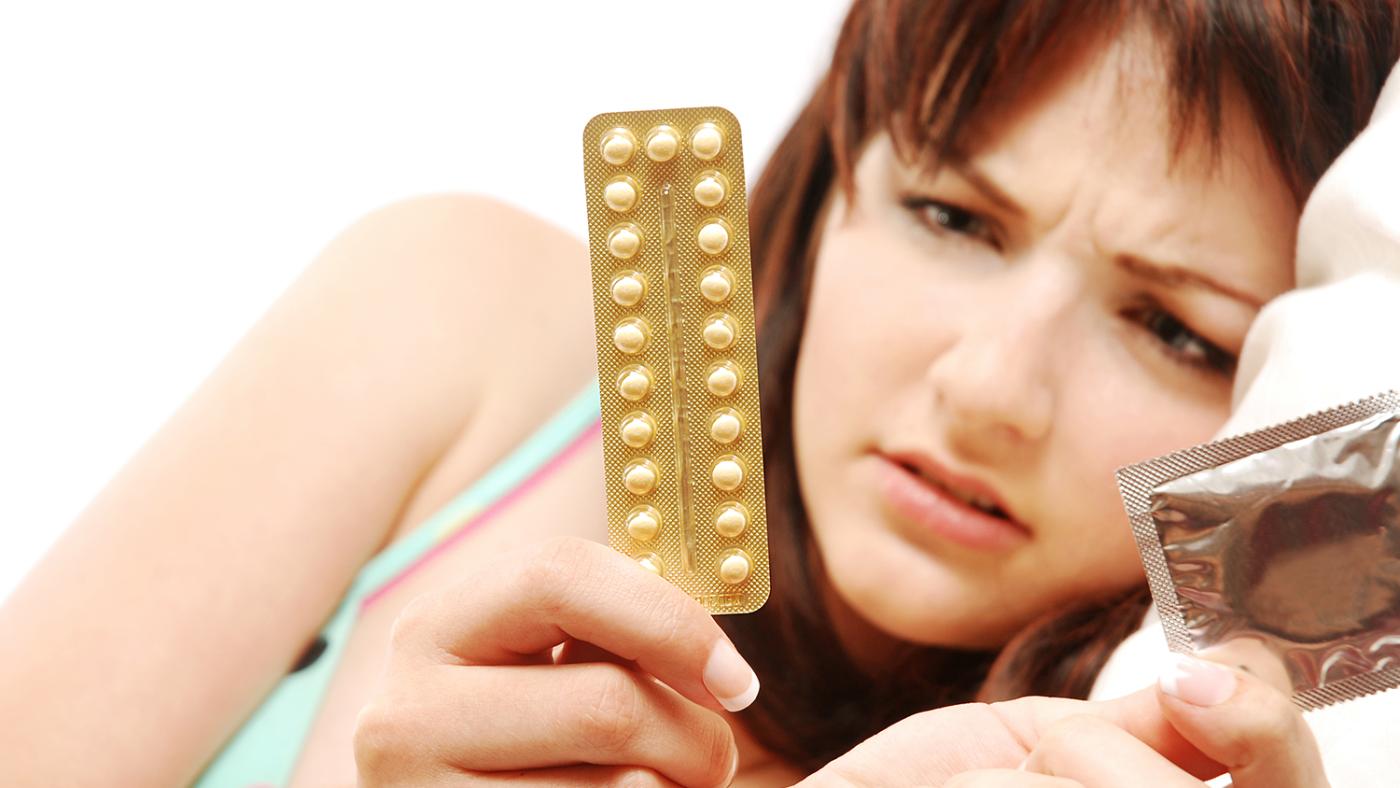In fear of side effects
‘What if the pill is affecting me, too?’

Recently, there have been numerous articles published about the decreased faith in hormonal contraception. The birth control pill, especially, is one that young people seem to be wary of. When the pill was launched in 1962, it quickly became the figurehead for bodily autonomy. These past decades, the discontent about this particular means to prevent pregnancy has increased. Doctors saw the number of abortions climb to new heights in 2022, and they link this development to the rise of ‘hormonephobia’, they say in a dutch article published by the NOS.
Number of terminations of pregnancy, 1985-2022.

Graph: ‘Number of terminations of pregnancy, 1985-2022’. Inspection Health and Youth, Report Law Terminations of Pregnancies (Wafz). https://www.igj.nl/over-ons/igj-in-cijfers/cijfers-zwangerschapsafbreking]
Although hormonal contraception is a reliable way to prevent pregnancy, the fear and hesitation amongst its users is growing, according to multiple media outlets. Many young people elect not to use the pill due to its possible side effects. Online, influencers use TikTok to share their own negative experiences with hormonal contraception. In doing so, they twist the facts about side effects or even share falsehoods, the Dutch Medicine Evaluations Board (CBG) stated recently.
Fog
Michelle and Machteld are two UU students who are hesitant about using the pill. They both started using it at a young age in order to alleviate the symptoms of their menstruation cycle. “I started taking the pill at 14,” Michelle says. “And I used it for a total of four and a half years.” After some time, it was also used as contraception. Machteld heard, after six years of taking the pill, that a friend of hers experienced symptoms of depression due to the pill, and wondered: “What if the pill is also affecting me, but I don’t know it?” At that point in her life, she wasn’t doing great. Moreover, her irregular schedule made it hard for her to take the pill at the same time every day. She decided to stop taking it, to test her theory. She didn’t feel any physical or mental differences. “I was doing better once my personal life was better.”
At a certain point, Michelle was looking for the cause of complaints she was experiencing like fatigue, bloating, stress, and symptoms of depression. These developed gradually. “I went to the doctor to talk about my symptoms, but he never said that they could be caused by the pill.” When she learned on TikTok that these issues could be caused by hormonal contraception, she decided to stop using the pill. “It was a last resort. But when I’d quit, that’s when I noticed how intensely the pill had changed me. I was suddenly a completely new person. Like a fog had been lifted from my mind. I used to be rather absent at times – that came with blunted emotions as well. It felt as though I’d returned to my own head now, and I could pay attention much better.”
Natural contraception
While the pill’s popularity is waning, more and more young people seem to be using natural methods of contraception instead. Take for instance Emily, UU student and DUB columnist, who questioned the use of the pill in her blog (only in Dutch), and mentioned switching to another method. She decided to keep track of her fertile days by taking her temperature and tracking her discharge: that way, you can estimate on what days your chances of conceiving are highest and lowest, she says. This method is quickly making its way around social media. Since publishing her column, Emily has changed her mind somewhat, partially because of an item in TV show De Avondshow with Arjan Lubach. She still practices periodic abstinence, but, she warns, the risk of becoming pregnant is much higher. “Especially for women whose cycles are irregular.”
The pill can have side effects. But it wasn’t until 2020 that the effects on mental health were taken seriously, when they were added to the general practitioners’ guide created by the Dutch GP Association. This change means that GPs are meant to inform people who wish to start using the pill not just on the physical side effects, but on other things as well, such as mood swings and lower libido. Michelle’s GP, for instance, never told her about that, and just mentioned that she should read the package insert. That’s why she never linked her own symptoms to the pill.
The students, too, think information about contraception could be better. “Whether or not to use the pill has to be a conscious decision,” Emily says. That choice can only be made with sufficient knowledge. Both Machteld and Michelle explain that they were barely – or not at all – taught about contraception in school, except for the condom. This fits with the national trend: Expertise centre Rutger states that 40 percent of Dutch young people are not educated about the use of contraception.

Side effects
Gynaecologist Charlotte Weimar from the UMC Utrecht explains in a video from the University of the Netherlands that not everyone experiences the same side effects from using the pill. Nine in ten women is not affected negatively, she says.
What the pill does is blunt your hormone levels. Normally, these vary throughout the month. Weimar explains that women who are affected by the regular hormone variations can be positively affected by the way the pill functions. Others, however, can feel somber instead. In other words: not everyone is affected by side effects.
Moreover, the root causes of symptoms of depression are difficult to trace back to the contraceptive pill, Weimar explains in the video. “There are studies that show a link between the use of the pill and depression. But a link does not mean there’s causation. Many women start using the pill at a young age – exactly the age when women are susceptible to depression. That’s why it’s difficult to claim that these issues are caused by using the pill.”
In an interview with the dutch paper de Volkskrant about her book How the Pill Changes Everything: Your Brain on Birth Control, American psychologist Sarah Hill said that she wants people to know about the pill’s side effects, even if nine out of ten people don’t experience any negative ones. “With my book, I want to make it clear that for many women, the pill is a completely logical choice, and often one of the best, but we also need to understand what we’re doing, and what we’re giving up to do it.” Emily, too, says she’s not against the pill, per se. “But it’s good to keep listening to your body.” Machteld: “It’s good to be aware of what you put in your body every day.”